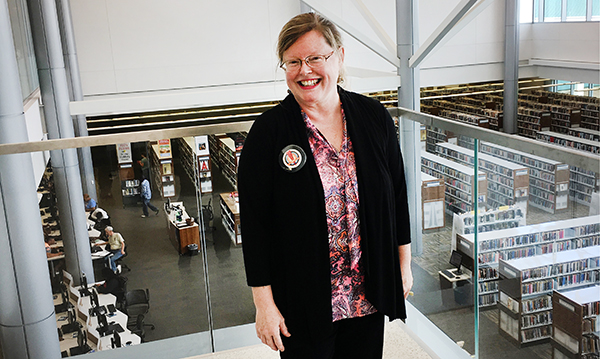By Mukul Verma
Librarians are pioneers. Smart and adventurous, they willingly try new ideas and technologies before employees of other government agencies do. Baton Rouge’s library system, for instance, will tag its entire collection with RFID chips. At a cost of more than $1.5 million, the tiny chips and readers will be good for patrons and library workers, who won’t have to wander the stacks to hunt and file misplaced books. To read how this story ends and if there is a sequel, we talked to a real character, Mary Stein, the No. 2 in the EBR library system.
Tell us about this fancy new system?
We’ll begin making the switch to RFID tags on all materials this summer. The technology uses radio waves to identify objects tagged with encrypted microchips. Each of the tags is the size of a small label. We will begin tagging our books, magazines, audio visual materials and other items this summer. No people will be tagged.
By tagging 2 million items, we will be able to offer self-check machines and intelligent returns at all 14 locations. Patrons will have the option to check-out items themselves without waiting in line, and returned items will be checked in immediately through the intelligent return system. RFID will let us use an automated sorting system at our highest circulating branches. There will be conveyor belts and bins to pre-sort all returned items.
How does the library sort and stack books now?
Patrons currently return their items through a simple book deposit box built into the wall or hand them to a staff member. We then check in each returned item by manually scanning the barcode, then hand sort by branch location, material type, department and collection. Then books are revised and shelved. Multiply this process by 2.7 million items for average circulation, plus another 300,000 items used in house. The barcodes are sometimes difficult to read and the scanner makes an acknowledging beep even if the item has not been correctly scanned. Plus, the items of patrons using the slot in the wall are not checked in immediately, which can result in confusion about what is still outstanding or how many items one has checked out.
How will the workflow change for you after the RFID chips are installed?
The simple book deposit box will be replaced with an intelligent return device, so that each item is automatically checked in as it passes through the portal. This means each item is immediately cleared off the patron’s record. It also means that machines will do the rough sorts of returned items. On the patron side, self-check machines at each branch should reduce long lines as patrons wait to be checked out. The self-check machines will also be able to handle patron transactions, such as paying fines and printing receipts as well as displaying calendar information and other library messages. Since the RFID scanners can scan multiple items at once, inventory control in the stacks will become a totally different process as we scan shelves, get reports of anomalies, and even set the scanner to “check in” items found on shelf.
Will this new system improve the library experience for readers?
Yes. Not only we will have a tighter collection with much fewer items out of place, but fewer misses in scanning items in or out will result in more accurate records in the patron account. The online catalog will be more accurate and the collection itself will be more accessible, since checkout and returns will be expedited. Additionally, the self-check machines have options for discovery of books, resources, and programs.
What other technologies are you installing soon at the libraries?
We have recently implemented online registration. With it, EBRPL library cardholders get an e-card that lets them use the Digital Library for 60 days. We implemented online renewals of expired library cards, so patrons who are in midst of reading an e-book don’t get caught while they are traveling away from Baton Rouge. The new Talking Tech service makes phone calls to patrons who lack email to alert them of books on hold or items becoming overdue.
Time to dream. What other technologies do you want to deploy at the libraries.
Drone delivery! Seriously, we are interested in delivery systems that could provide better outreach to seniors and others with mobility or access issues. Also, book dispenser kiosks for the airport, mall, hospital or other large community gathering place; and technology to help with independent publishing and document creation and distribution. Virtual reality applications. Interactive digital exhibits and displays. Open Source catalog, integrated library system. Better-defined merchandised technology solutions to deliver reader’s advisory suggestion services.

